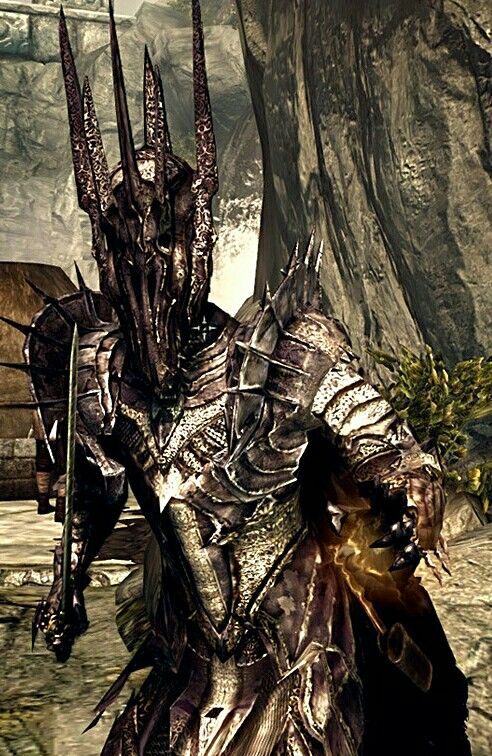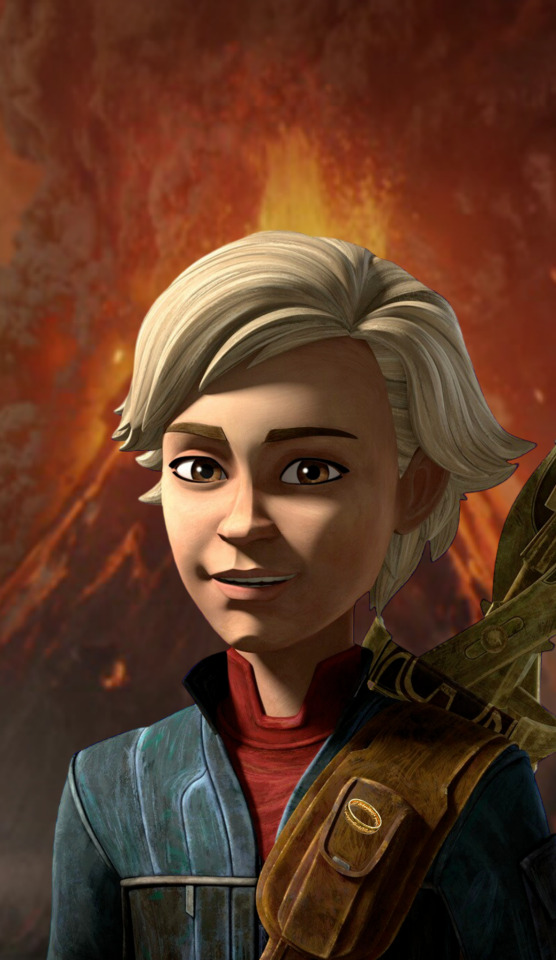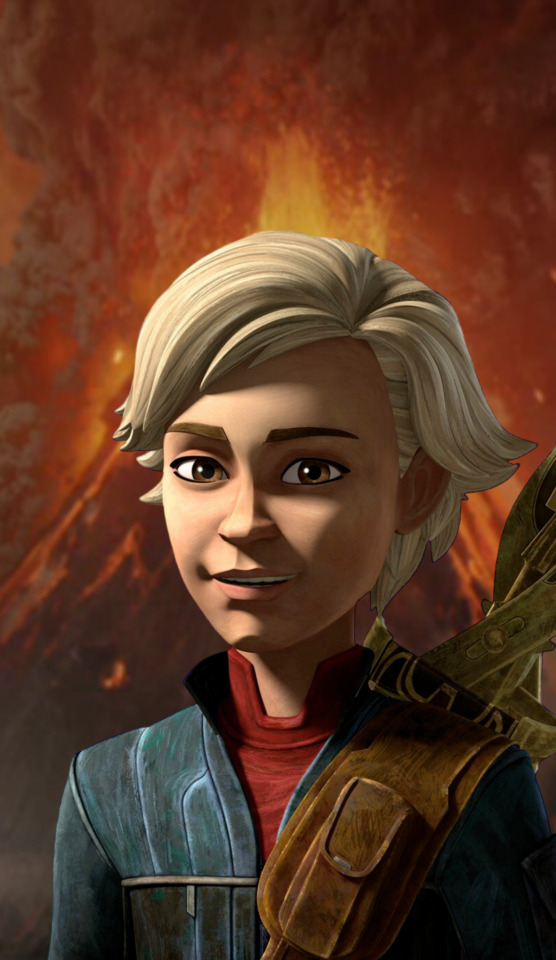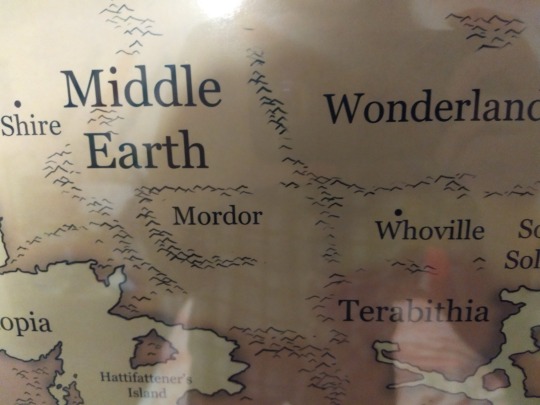#Land of Mordor
Explore tagged Tumblr posts
Text

"...HE WROUGHT HIMSELF A NEW GUISE, AN IMAGE OF HATRED AND MALICE MADE VISIBLE..."
PIC INFO: Spotlight on an illustration of Sauron, the Dark Lord and Enemy of the Free Peoples of Middle-earth, as he appeared during the Battle of Dagorlad in Peter Jackson's "Lord of the Rings" film trilogy (2001-2003). Artist unknown.
"...his spirit arose out of the deep and passed as a shadow and a black wind over the sea, and came back to Middle-earth and to Mordor that was his home. There he took up again his great Ring in Barad-dûr, and dwelt there, dark and silent, until he wrought himself a new guise, an image of malice and hatred made visible; and the Eye of Sauron the Terrible few could endure."
-- "QUENTA SILMARILLION," "Akallabêth," written by J.R.R. Tolkien, published 1977
Sources: www.pinterest.com/pin/488218415837584309 & www.henneth-annun.net/events_view.cfm?evid=1060.
#Sauron#The Second Age#Second Age#Land of Mordor#Fellowship of the Ring#In the Land of Mordor Where the Shadows Lie#Sauron Armor#The Lord of the Rings#Middle-earth#The Fellowship of the Ring#The One Ring#The Battle of Dagorlad#Plateau of Gorgoroth#Fall of Númenor#Barad-dûr#Battle of Dagorlad#LOTR#Lord of the Rings#J.R.R. Tolkien#Tolkien#Battle of the Last Alliance#The Dark Lord#Gorthaur#Gorthaur the Cruel#Sorcery
5 notes
·
View notes
Text
//Tag drop
#Gil-galad was an elven king (promo)#Of him the harpers sadly sing (playlist)#The one whose realm was fair and free (lindon)#Between the mountains and the sea (headcanons)#His sword was long his lance was keen (nsfw)#His shining helm afar was seen (wardrobe)#The countless stars of heaven's fields (aesthetics)#Were mirrored in his silver shield (weaponry)#But long ago he rode away (hiatus notice)#And where he dwelleth none can say (queue)#For into darkness fell his star (history)#In Mordor where shadow are (memes and starters)#v: snows of hithlum (childhood)#v: círdan's home (childhood)#v: the pearls of balar (youth)#v: young high king of the noldor (youth)#v: the war of wrath (youth)#v: foundations of lindon (between the mountains and the sea)#v: elvish rings and elvish forges (between the mountains and the sea)#v: the faithful ships (between the mountains and the sea)#v: of elves and men (tall ships and tall kings)#v: Starlight (tall ships and tall kings)#v: moon's fall (the last alliance)#v: keep darkness at bay (the last alliance)#v: aeglos and narsil none could withstand (the last alliance)#v: starlight (the last alliance)#v: the halls of mandos (into the west)#v: the undying lands (into the west)#v: in Mordor where he never fell (survival au)#v: Starlight (in Mordor where he never fell)
7 notes
·
View notes
Text
my computer is STILL getting fixed, so poor Ryndel has been frozen in Mordor for over a month
#“IM NOT EVEN PLOT RELATED GET ME OUT OF HERE”#lotro#I miss lotro so much#not even Mordor but the rest of it#let me play so I can get out of Doom Land PLEASE
7 notes
·
View notes
Text



the master mangler is once again the victor!
#lotro#the black book of mordor#< blacklist for spoilers if you havent done mordor - dale lands - ered mithrin - minas morgul#rhovador
20 notes
·
View notes
Text

October 28
The Return of the King, Book 6, Chapter 2: The Land of Shadow
#lord of the ring-along#lord of the rings#lotr#read along#three months to mordor#the return of the king#october 28#the land of shadow
3 notes
·
View notes
Text
Omega, precious one, Mordor isn't safe.




#omega is adorable#omega bad batch#tbb omega#omega the bad batch#omega tbb#omega#mordor#the land of mordor#star wars the bad batch#star wars bad batch#starwars bad batch#sw tbb#star wars#star wars fan art#star wars fanart#starwars fan art#starwars fanart#starwars
11 notes
·
View notes
Text
got to the mt doom chapter in my reread and i always underestimate just how affectionate frodo and sam are with each other especially in the end. love the movies but. peter jackson failed to adapt the kissing and kissing and kissing and kissing
#rowan screams into the void#its truly mordor the land of the faggots. mx sauron those fruits are going at it under your gaze#i always feel embarassed mentioning this shit but its not like im making it up!! they just do that!! so much!!
4 notes
·
View notes
Text
"Never trust a man in a tunic"
"..? I'm an ELF!"
One of my favorite hobbies is thinking about the fucked up implications of this fantasy world map my parents got me for christmas

[Image ID: photo of a map. On the left side of the map is Middle Earth, with the Shire and Mordor labeled. To the direct right of Mordor is Whoville.]
#mordor and terabithia being neighbors kinda checks out#but then whoville???#this is the greatest thing ive seen in my life i want one#dinotopias location is perfection#land of the lost as well
73K notes
·
View notes
Text
Then shouldering their burdens, they set off, seeking a path that would bring them over the grey hills of the Emyn Muil, and down into the Land of Shadow.
"The Lord of the Rings: The Fellowship of the Ring" - J.R.R. Tolkien
#book quotes#lotr#lord of the rings#jrr tolkien#tfotr#the fellowship of the ring#frodo#samwise gamgee#hobbits#emyn muil#land of shadow#mordor
0 notes
Text

BECAUSE "FELLOWSHIP" HAD THE BEST ORCS -- CHANGE MY MIND.
PIC INFO: Spotlight on a throwback "Lord of the Rings: The Fellowship of the Ring" (2001) postcard, featuring a Mordor orc from the Battle of the Last Alliance sequence, and displaying the full extent of prosthetic genius à la Weta Workshop and the rest of the Peter Jackson production crew. New Line Cinema.
Source: www.muscara.com/catalog/Lord_Rings_Postcard_Fellowship_Ring__Orc_solo.
#Orcs#The Lord of the Rings#Mordor#Mordor Orcs#JRR Tolkien#Postcards#Fellowship of the Ring#Dark Fantasy#Mordor Orc#Land of Mordor#LOTR#Lord of the Rings Movies#Prosthetics#Orc prosthetics#Orc#Weta Workshop#The Fellowship of the Ring#LOTR Movies#Practical Effects#Peter Jackson Trilogy#Prosthetic Makeup#Jackson Trilogy#Makeup Effects#LOTR Orcs#Tolkien#J.R.R. Tolkien#Lord of the Rings Trilogy#The Lord of the Rings: The Fellowship of the Ring
2 notes
·
View notes
Text
mixed feelings about Tolkien making people of the east and south come to Aragorn for pardon like he's actual jesus christ on judgement day, but I really appreciate that Tolkien's idea of a good king is 1) realising that the true enemy is defeated, and not making the war last longer that it needs to last 2) sending free the people who used to be on the other side of the war, but now come to you in peace 3) freeing slaves 4) giving people their land (the woses's land is their own and no-one is allowed to enter without their permission, same for the shire, rohan does not become a part of the Reunited Kingdom, slaves of mordor get land of their own)
9K notes
·
View notes
Text
There, peeping among the cloud-wrack above a dark tor high up in the mountains, Sam saw a white star twinkle for a while. The beauty of it smote his heart, as he looked up out of the forsaken land, and hope returned to him. For like a shaft, clear and cold, the thought pierced him that in the end the Shadow was only a small and passing thing: there was light and high beauty for ever beyond its reach. - The Return of the King

Ah, now here’s one I’ve been looking forward to discussing. Lord of the Rings has a strange relationship with hope. Before I began this read-through, I would have told you that hope is at the core of LotR: hope that the war will end, hope that light will triumph over darkness, hope that “there’s some good in this world, Mister Frodo, and it’s worth fighting for”. I would have told you that it’s an innately cheerful, optimistic story, though it gets dark at times.
But over this past year, as I’ve reread this book with the eyes of an adult, I’ve begun to realize it’s more complicated than that.
Lord of the Rings is not a story about hope. It’s a story about what you do without hope. It’s a story about when your spirit is utterly defeated, and your prospects are grim, and both the best and the worst possible outcomes look shockingly alike, and yet you keep walking anyway. It’s not a story of blind, naive optimism, of sitting back and dreaming about a better about-to-be. It’s a story of weighing the facts with a clear mind, of realizing that there’s no way in hell this works out well for you, and of doggedly moving your grain of sand to tip those massive scales anyway, because the only other option would be to sit back and let the world burn.
I feel like that rings truer to the human condition, really. After all, what good is it in the end to be kind and generous and courageous; what good is it to waste our short lives trying to make this awful world a better place? For every one human being trying to be a good person, there are hundreds more who are selfish, cruel, exploitative, greedy, twisted, and wicked. For every good deed done on this planet, there are hundreds more murders and abuses and horrors. One day, you will die, and at some point, everyone who knew you will be dead. There will come a day when you will be utterly forgotten. No one will remember you. No one will remember what you did. No one will remember if you made a difference, if you tried to make the world a better place. And let’s be honest; you won’t. No matter what light you managed to throw into the world while you were alive, this awful cosmos will generate enough pain and misery to overshadow it, eventually. When you’re gone, the world will be just as bad as it always was. Always has been. Always will be.
What good is it to go on loving someone when the diagnosis is terminal—when the medicine doesn’t work—when the sickness in their head has locked the person you love behind an unbreakable concrete wall? What good is it to stand for what you believe in when it’s not popular anymore—when friends and family turn their backs and reject you—when those who gave you praise and encouragement now insult you and curse you and spit on your face? What good is it to love when your heart is broken, be kind when your skin is mottled with bruises, be brave when your back is bent and your arms are weary under the weight of it all? What good is it to cast your little candle light when all the wind in the world tries to blow it out? Why be good? Why be selfless? Why sacrifice so much, when you lose so much more than you gain?
In that moment, there’s only one answer. And it’s not hope. It’s not optimism. It’s some strange defiance, some visceral fire that roars in the chest and aches in the bones.
“I will be light,” it cries. “I will defy you,” it howls. “I will push back with the last of my strength, though you crush me down,” it screams. “Because if I am not light, I am darkness, and I cannot, I will not, I refuse; let me die with my knees unbowed and my head held high; I WILL NEVER SURRENDER”
There are many instances in the book that speak to this point—Aragorn himself says something along the lines of “we must do without hope for the moment”—but to me, nothing better encapsulates this strange spirit of hopeless defiance than this moment with Sam Gamgee.
“Sam said nothing. The look on Frodo’s face was enough for him; he knew that words of his were useless. And after all he never had any real hope in the affair from the beginning; but being a cheerful hobbit he had not needed hope, as long as despair could be postponed. Now they were come to the bitter end. But he had stuck to his master all the way; that was what he had chiefly come for, and he would still stick to him. His master would not go to Mordor alone. Sam would go with him.”
Sam would go with him. Not “we will win”. Not “I believe in us”. Just “he will go, and I will go with him, whether this ends in (improbable) victory or (more probable) a horrible, horrible death”. It’s not that Sam’s hope began to fail here; it’s that he never had much hope to begin with, but he went with it anyway, and it’s only his cheerful disposition in the face of near certain disaster that ever began to flag. Holy cow.
Now these three remain: faith, hope, and love; but when the first two fail, love is the unkillable cockroach of all the virtues and will survive the nuclear winter of utter despair and grow wings and fly buzzing right up into your face just to spite you.
Now, of course Lord of the Rings does not simply leave us with the tragedy of a futile fight against the darkness. This story has a happy ending. And I’m glad it does, because sometimes, there are happy endings. Sometimes sicknesses are cured, families are restored, and old scars are healed and begin to fade. Sometimes loved ones emerge from the prison of their own minds and return to you—wiser, more melancholy, but still themselves—and you discover that the bond is deeper, the smiles sweeter, the laughter richer, and the love galvanized into something stronger than it ever would have been. Sometimes there are happy endings, and it’s not wrong to want them. It’s not wrong to have hope.
But Lord of the Rings lets us linger in that moment of hopeless defiance, because it offers an odd sort of comfort of a totally different kind.
“Lost all hope, did you?” it whispers. “It’s all right. So did Frodo, and Aragorn, and Gandalf, and Sam. But you see, they kept fighting anyway, with hope or without it, and that’s what made them heroes. Oh, you might still have your happy ending, someday, and it might come in ways you don’t expect. It is also equally likely that nothing will get better, and it will actually get much worse, and you shall die. But do keep fighting. Do keep walking. One foot in front of the other. If you do nothing, the worst will definitely come to pass; but if you fight, it just might not. So if we shall win, let’s not be embarrassed by our cowardice when that happy ending comes; and if we shall lose, let’s not go down without a fight.”
Perhaps, paradoxically, that’s what makes Lord of the Rings the most hopeful story of all. Because this is the story that whispers, “Remember, when all hope is gone��
“It isn’t.”
WORD ASK GAME!
#lord of the rings#lotr#hope#the whole time i was reading i was bursting to say what you said at the end there#that this is what makes lotr the most hopeful story of all#because hope is not the same thing as optimism#sort of like how joy is not the same thing as happiness#you can be joyful even while unhappy#and so can you be hopeful even while pessimistic#you might be stuck in mordor#you might be about to die there#in a thirsty blasted land full of ash and choking smoke#but even if you die there is still goodness and beauty beyond the reach of the shadow#it might be beyond your reach too!#but the light EXISTS#and that's enough reason to keep trying to push back the darkness#(don't mind me just crying in the corner over here as usual)#(this is why lotr is in my SOUL)
300 notes
·
View notes
Text
The fact that Sauron finds out what the real plan was when he senses Frodo wearing the Ring in Mordor ultimately adds to the satisfaction of his downfall. If Frodo hadn’t done that, Sauron wouldn’t have known why his land was suddenly collapsing and why his own form was withering away. But because of what happens, when the Ring is finally destroyed, Sauron knows exactly why and how. And his last thoughts are about how he was fooled, tricked, deceived, and totally outwitted by people with 1000x less power than him. That was actually the best punishment that Frodo could’ve given him: the blow to his ego that he deserved.
2K notes
·
View notes
Text
One does not simply walk into Mordor?
Not only would Galen do just that, but he'd tear down its gates, perform a one-man siege against it, and destroy everything in his path

#star wars#the star wars saga#galen marek#starkiller#starwars#starkiller fan art#sw fan art#starwars fan art#star wars fan art#jedi#the land of mordor
7 notes
·
View notes
Text
(tw: death, gore, horror)
I love how downright creepy Sauron is.
He's your neighbourhood psychopathic genius, a skilled sorcerer whose allegiance was realigned once (to his true alignment imo) and then never since waivered.
Unlike Morgoth, who was more straightforward in his execution, Sauron's style is insidious, and in a sense more horrific for how slow and personal his tactics can be. His temper is such that he can play the long game, even play at being weak in order to earn trust or make his enemies complacent, and then next thing you know he has an old friend's corpse up as a war banner, or he has sunk a once great island down the Sea.
He bred the Orcs. Tolkien played with different version of the origin of Orcs, but what I like best is the version where they were corrupted Men, maybe even Elves, and although they were Melkor's idea, it was Sauron who had the ability, patience and tenacity to make the idea come to fruition.
He built cults. Do you know what cults are like? How they draw people in, what they make people believe, what they get people to do? From an outsider looking in it must have looked truly bizarre, but Sauron was able to turn a powerful nation against the Valar and painted Morgoth as the true god. Eru Ilúvatar was denied as a false god, and the Valar made to be liars. There were blood sacrifices, human sacrifices—all for a religion Sauron invented, but was so successful that, once Númenor was gone, Sauron brought the cult with him to Middle-earth.
He was called The Necromancer. What made him garner the title? Who gave it to him, and what had they seen? Surely the Nazgûl were not the first of their kind, not when the Nine were already so well-made. What manner of experimentation had Sauron done in order to make them, and what did the "failures" look like? What knowledge did he use to corrupt and circumvent the Gift of Ilúvatar, which gave Men free will and death, allowing their spirits to transcend Arda? And yet the Nazgûl were unable to die, and as wraiths they also lost their free will, bound to Sauron and the call of the Ring.
He corrupted kings. He corrupted his own kind. Curumo could not have been the only one, and we know Curumo was a powerful Maia in his own right, the leader of the Istari. Sauron played mind games with the best of people, and won. His ability to seduce even the most powerful beings and get them in his service was unparalleled.
Now imagine being a native of Mordor and witnessing the poisoning of the lands. And then an age later, imagine being from one of the villages around Rhovanion and experiencing the slow haunting of Amon Lanc. At least the Eldar could see Sauron and his agents; none of the Men can do so. What defense did the common Man have against such insidious evil? There must only have been odd sensations, a dread settling in, dreams that lure them in before turning into nightmares.
#god i love him#i don't say it enough but sauron is my favourite villain#best villain in all of literature and you cannot convince me otherwise#sauron#mairon#but this is why i call him sauron#he earned that name#the lord of the rings#the silmarillion#tolkien's legendarium#meta
595 notes
·
View notes
